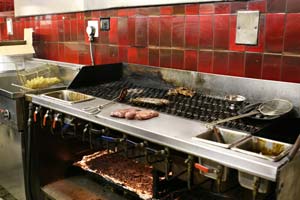A common challenge faced by many restaurants and commercial food establishments is how to deal with fats, oils, and grease (FOG) from the dishes. Most commercial kitchens have a grease trap system installed to help deal with the FOG.
The filters separate the FOGs from the water coming out of kitchen drains, sinks and dishwashers before it flows into the municipal facilities. Even though the filters work efficiently, they too need frequent cleaning to guarantee satisfactory performance.
The following are a few valid reasons as to why you should clean your grease traps frequently.
Noxious Odors
Over time a substantial amount of FOG accumulates in the grease trap. The piled up debris rots and starts emitting a foul smell. In fact, if left unattended the stench can become so pungent even if the FOG trap is outside or underground. It can be detrimental for a food establishment if noxious odors engulf the premises when entertaining guests. Not only will it give the restaurant a bad reputation, but the business is likely to lose a significant number of customers.

Costly Tank Damages
Food remains and FOGs contain chemical compounds. If you leave them on the tank for long, they will eventually break down, leading to the formation of hydrogen sulfur gas, which in turn will create sulfuric acid. Sulfuric acid is highly toxic and has the potential of damaging the steel and concrete walls of the grease interceptor. Evidently, replacing the damaged tank will require time and money. Avoid such a predicament by cleaning the grease trap regularly.
Makes Cleaning Easier
After multiple usages, you will notice that food sediments begin to pile at the bottom of the container. If that goes on unabated, the trapped food particles will continue accumulating to form a thick hard mass of food waste, which is not easily removable. Soon the debris will transform into a pesky immovable barrier making the cleaning of the trap virtually impossible.
Ultimately, you will have to contend with an inefficient and stinky grease trap. Fortunately, you can avoid all these by conducting regular cleaning and maintenance of your grease traps.
Clogging and Drain Problems
As evident above, the continuous accumulation of FOG in the grease trap will result in a hardened layer of food debris. This will obstruct the free flow of water from the kitchen sink or dishwasher, to the Raleigh municipal drain system. Since the flow is inhibited, both the water and the materials it contains, will overflow and spill backward, causing more damage. However, through regular cleaning, you can keep the trap clean and free from any obstructions.
Penalties from the Health Department
In a bid to safeguard the health of its residents, North Carolina municipalities often conduct regular inspections and tests of the effluent from hotels and restaurants. During those assessments, they examine the drain’s outflow as well as the grease trap system. If they detect high levels of oil passing through your drain into the municipal sewer, they can penalize you.
The penalty can come in various forms including fines, suspension of operation or even revocation of the operating license until you satisfactorily address the situation. A typical reason for the high grease presence in the water that drains into the municipal sewers is an overfill of the tank’s retention capacity. Hence, if you clean your tank regularly, such a situation is unlikely to occur.
Loss of business
When foul smell emanating from the dirty trap fills up your North Carolina restaurant, you might chase away customers, or the local authorities might compel you to suspend operations. Both of these situations will result in loss of income and business. Which is unfortunate, especially if you are operating in an area with stiff competition. Your rivals will have a field day as you wallow in your misfortune. Moreover, you might end up losing a few regular patrons over to them.
Conclusion
Even though grease trap cleaning might seem like a tedious task, it has both financial, social, and health benefits. All you need to do is hire a reputable grease trap cleaning company. They’ll put in place a grease trap cleaning schedule to make sure your operations run smoothly.
If you’d like more information about grease trap cleaning services don’t hesitate to give us a call at 919-817-8706 or contact us today!




